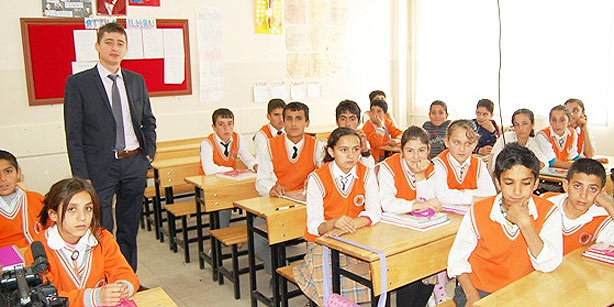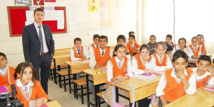For students and researchers, even more than people looking to settle a bet or recall the name of an actor in a movie, the obstacles are serious.
“Wikipedia used to be the major online information source for many students. We need the website to be reopened,” said Esra, a 20-year-old student.
Ayse, a high school teacher, said she has caught pupils trying to copy and paste their way to good grades, but still believes the ban on Wikipedia should come to an end.
“At the end of the day, we live in the age of information,” she said.
Yaman Akdeniz of Bilgi University's law faculty in Istanbul has been appealing to the courts to get the block lifted, so far to no avail.
“We of course learn to live without the platform but it is a significant deficit in terms of access to information as Wikipedia has always been a primary resource for quick access to facts and data for everyone,” he said, adding that the ban since April was political, not educational.
The site was blocked on a court ruling after a request from the government, citing a public order and safety law.
Two English-language articles, including one on the Syrian civil war and Turkey’s involvement, appear to have angered the authorities.
More than 100,000 websites are blocked in Turkey, according to Freedom House, a US-based think-tank. Turkey is the leading country asking for Twitter to censor content on the social media site, with 19 per cent of demands met. Facebook also blocks some pages.
The non-profit organization behind Wikipedia does not generate its own content; rather, volunteer editors and writers create and update articles.
There are better and worse articles on the site, some of which are flagged as being improperly sourced or lacking objectivity.
Studies are being done to determine if Wikipedia, with more than 5 million articles in English alone, is reliable.
A Harvard Business School study from 2014 found that some lengthy Wikipedia articles had a left-wing bias, but the more content is edited, those partisan views tend to be rinsed out.
Yasemin, a university student, said that for her the website is a useful platform to launch research projects.
“We used Wikipedia to be able to check our ideas and compare them with what already exists,” she said. “I know it is not totally reliable, but you can check the sources and go to the original links.”
Turkey’s Ministry of Communications, which enforces the ban, and the Ministry of Education both declined to comment for this article.
The ban also means that the Turkish-language Wikipedia, with more than 200,000 entries, is starting to stagnate.
Meanwhile, articles published in other languages could end up having an anti-Turkish bias without contributions from the country's now-blocked editors, at a time when Turkey is becoming a more assertive regional power.
Yasemin sees the ban on Wikipedia within a wider context of Turkey’s current struggles with free speech in a time of political unrest.
She notes journalists are in jail, news outlets are increasingly under pressure and there are court cases against people for “insulting” government officials.
“Critical thinking is in decline in Turkey,” she said. It also leads to a feeling of being in a panopticon, she said, where one is watched all the time.
“The government wants students and citizens to receive only one-sided information and it wants the things it says to be accepted as correct,” said Baris Yarkadas, a member of parliament from the main opposition People’s Republican Party (CHP).
He noted that evolution has largely been dropped from the education curriculum, with the government saying such a subject would be better taught only at an undergraduate level. At the same time, there is more focus on religious studies.
“Where fear rules, there is no science, there is no research,” Yarkadas said.
--------------------------------------------------------------------------------------------------------------------
“Wikipedia used to be the major online information source for many students. We need the website to be reopened,” said Esra, a 20-year-old student.
Ayse, a high school teacher, said she has caught pupils trying to copy and paste their way to good grades, but still believes the ban on Wikipedia should come to an end.
“At the end of the day, we live in the age of information,” she said.
Yaman Akdeniz of Bilgi University's law faculty in Istanbul has been appealing to the courts to get the block lifted, so far to no avail.
“We of course learn to live without the platform but it is a significant deficit in terms of access to information as Wikipedia has always been a primary resource for quick access to facts and data for everyone,” he said, adding that the ban since April was political, not educational.
The site was blocked on a court ruling after a request from the government, citing a public order and safety law.
Two English-language articles, including one on the Syrian civil war and Turkey’s involvement, appear to have angered the authorities.
More than 100,000 websites are blocked in Turkey, according to Freedom House, a US-based think-tank. Turkey is the leading country asking for Twitter to censor content on the social media site, with 19 per cent of demands met. Facebook also blocks some pages.
The non-profit organization behind Wikipedia does not generate its own content; rather, volunteer editors and writers create and update articles.
There are better and worse articles on the site, some of which are flagged as being improperly sourced or lacking objectivity.
Studies are being done to determine if Wikipedia, with more than 5 million articles in English alone, is reliable.
A Harvard Business School study from 2014 found that some lengthy Wikipedia articles had a left-wing bias, but the more content is edited, those partisan views tend to be rinsed out.
Yasemin, a university student, said that for her the website is a useful platform to launch research projects.
“We used Wikipedia to be able to check our ideas and compare them with what already exists,” she said. “I know it is not totally reliable, but you can check the sources and go to the original links.”
Turkey’s Ministry of Communications, which enforces the ban, and the Ministry of Education both declined to comment for this article.
The ban also means that the Turkish-language Wikipedia, with more than 200,000 entries, is starting to stagnate.
Meanwhile, articles published in other languages could end up having an anti-Turkish bias without contributions from the country's now-blocked editors, at a time when Turkey is becoming a more assertive regional power.
Yasemin sees the ban on Wikipedia within a wider context of Turkey’s current struggles with free speech in a time of political unrest.
She notes journalists are in jail, news outlets are increasingly under pressure and there are court cases against people for “insulting” government officials.
“Critical thinking is in decline in Turkey,” she said. It also leads to a feeling of being in a panopticon, she said, where one is watched all the time.
“The government wants students and citizens to receive only one-sided information and it wants the things it says to be accepted as correct,” said Baris Yarkadas, a member of parliament from the main opposition People’s Republican Party (CHP).
He noted that evolution has largely been dropped from the education curriculum, with the government saying such a subject would be better taught only at an undergraduate level. At the same time, there is more focus on religious studies.
“Where fear rules, there is no science, there is no research,” Yarkadas said.
--------------------------------------------------------------------------------------------------------------------









 Home
Home Politics
Politics











